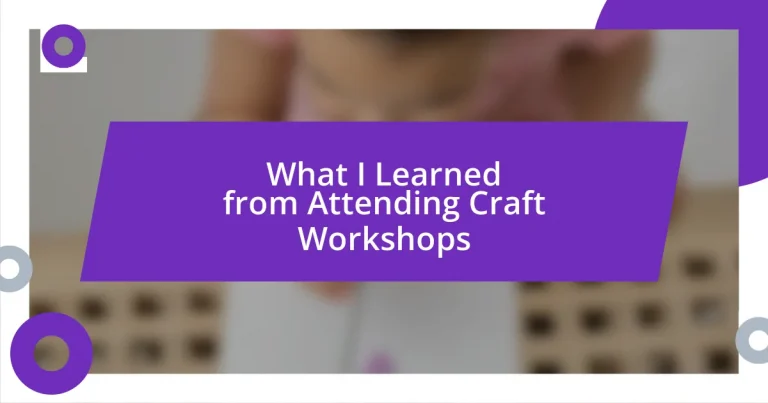Key takeaways:
- Craft workshops foster a strong sense of community, connecting individuals through shared experiences and creativity.
- Participants develop valuable skills, including technical abilities, problem-solving, creativity, and collaboration through hands-on practice.
- Reflecting on workshop experiences enhances personal growth and inspires future creative endeavors, turning challenges into opportunities for self-expression.
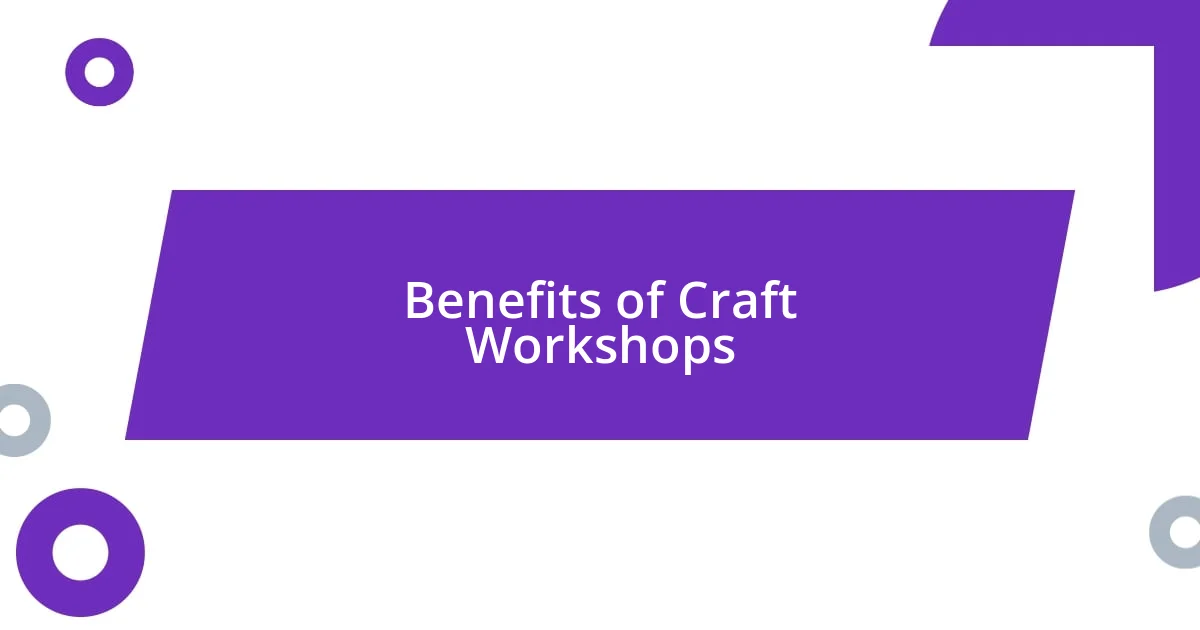
Benefits of Craft Workshops
One of the most wonderful benefits of attending craft workshops is the sense of community they foster. I remember my first pottery class; I felt a bit out of place at first, but as we all got our hands dirty shaping clay, those initial nerves melted away. Isn’t it amazing how a shared experience can connect strangers in such a meaningful way?
Craft workshops also provide an incredible opportunity to learn new skills. I was surprised at how quickly I picked up painting techniques that I had struggled with for years. It’s not just about creating something beautiful; it’s about gaining confidence and discovering hidden talents—who knew I had an artistic side just waiting to burst forth?
Additionally, engaging in crafts is a fantastic way to relieve stress. After a long week, I often turn to my knitting projects not just to create but to unwind. Have you ever noticed how focused you become when working with your hands? It’s like a meditation journey, where the clatter of daily life fades away, leaving you refreshed and centered.
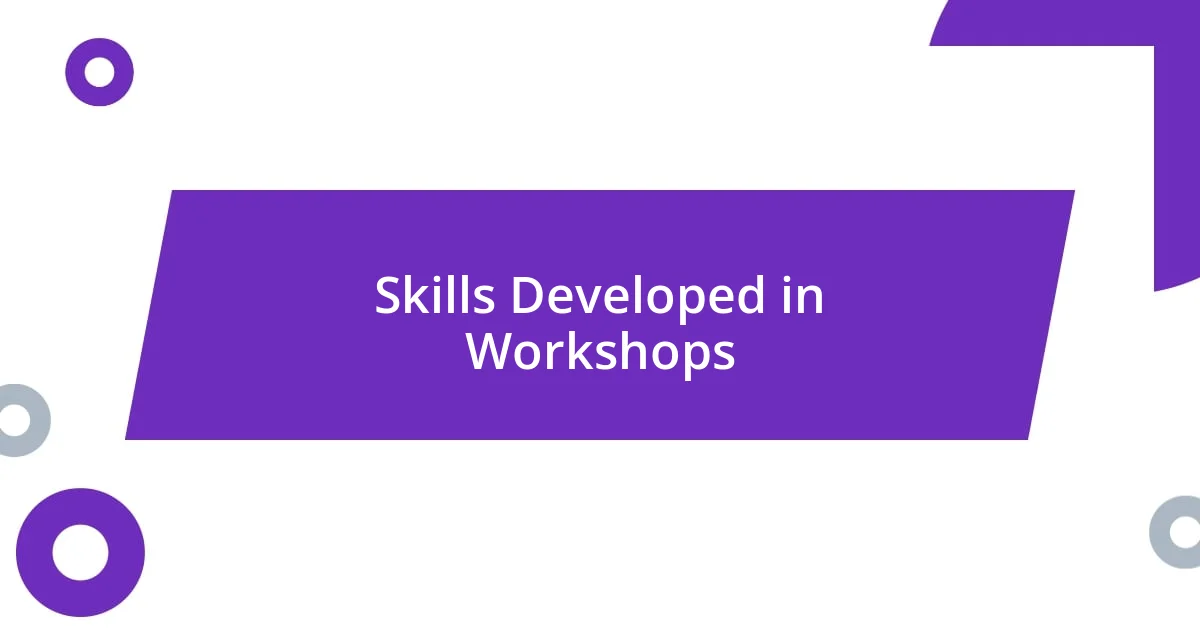
Skills Developed in Workshops
Attending craft workshops has sharpened my skills in various ways that I never anticipated. For instance, when I joined a candle-making workshop, I struggled initially with measurement and pouring techniques. After a few tries, I started to notice how accuracy and patience paid off. That sense of accomplishment? It’s a thrill I never thought I’d get from melting wax!
Here’s a quick rundown of the skills I’ve developed through workshops:
- Technical Skills: Gaining hands-on experience with tools and techniques specific to each craft.
- Problem-Solving: Learning to troubleshoot issues, like fixing a poorly set glaze or adjusting patterns in sewing.
- Creativity: Engaging in imaginative thinking, discovering unique ways to express myself through my chosen medium.
- Patience and Focus: Cultivating the ability to concentrate deeply on the task at hand, especially during intricate projects.
- Collaboration: Working alongside other passionate crafters, learning to communicate ideas and techniques effectively.
Each of these skills has added depth to my crafting journey, making it not just about finished products but also about the enriching experiences along the way.
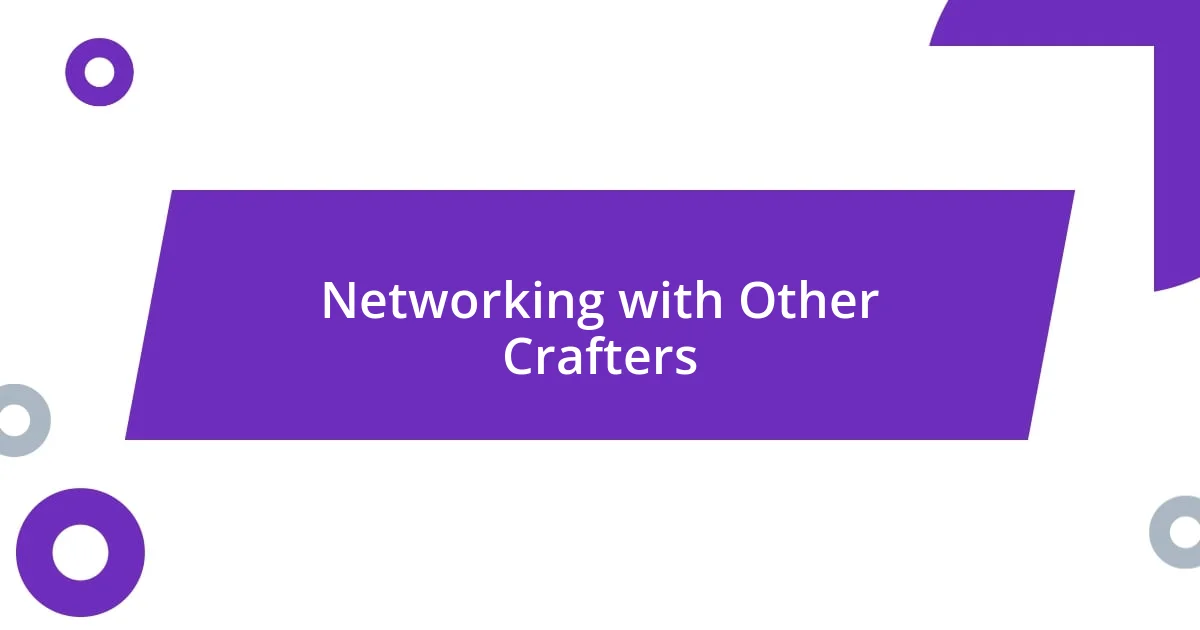
Networking with Other Crafters
Networking with other crafters can truly elevate your crafting experience. During a recent embroidery workshop, I met a fellow crafter who turned out to be a textile teacher. We spent hours discussing different techniques and sharing resources, which was such a pleasant surprise. Have you ever had a chance encounter that suddenly opened new doors? I found that connection incredibly valuable, as it introduced me to an entirely new world of crafting that I hadn’t explored before.
Additionally, I discovered that these workshops are a melting pot of ideas and inspiration. One time, while working on a collage project, I noticed how someone nearby transformed everyday materials into stunning pieces. Watching them work lit a spark in my mind about reusing scraps from my previous projects. It felt like being part of a dynamic brainstorming session. Interacting with other crafters is not just about sharing knowledge; it’s about igniting creativity through collaboration.
Finally, the friendships I’ve formed can’t be overlooked. There’s something special about swapping tips and tricks with someone who shares your passion. I recall a late-night sewing circle where we all laughed over our sewing machine mishaps from earlier that day. Those moments of camaraderie make crafting not just about creating but about building a supportive community that you can lean on.
| Benefits of Networking | Examples |
|---|---|
| Connections | Meeting experienced crafters opens doors to mentorship opportunities. |
| Inspiration | Discovering new techniques from others enhances creativity in your own work. |
| Support | Building friendships with fellow crafters fosters a sense of belonging. |
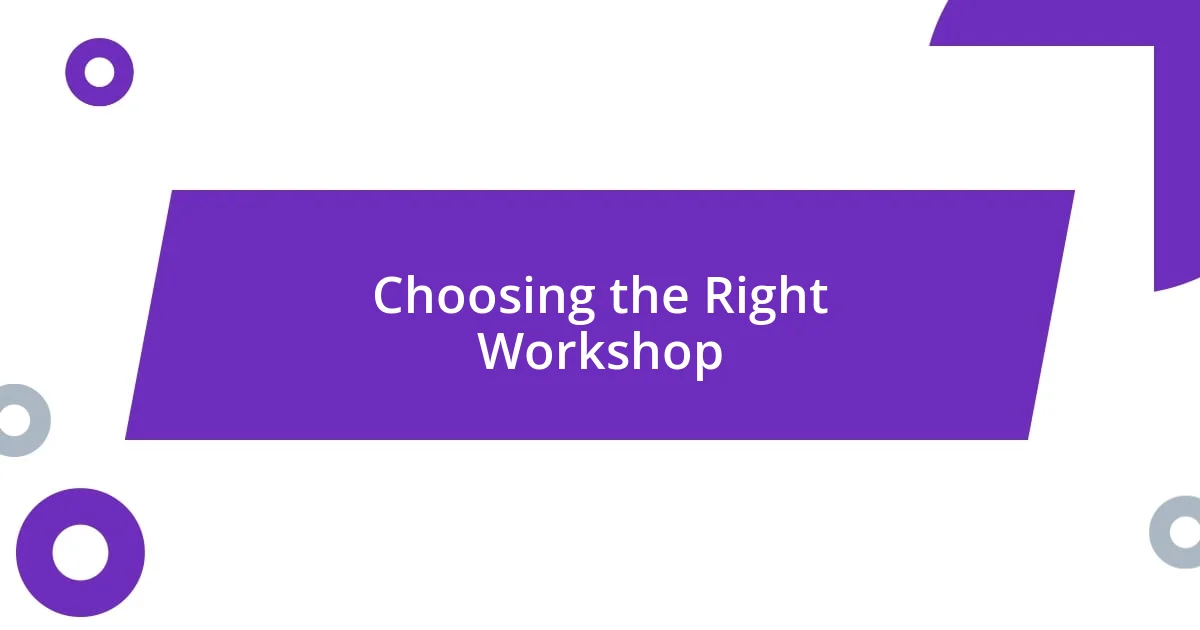
Choosing the Right Workshop
Choosing the right workshop can seem overwhelming given the vast amount of options available. I remember browsing through listings for pottery classes and feeling a mix of excitement and anxiety. How do you know which one suits your needs? I realized it’s essential to consider your skill level, the specific techniques you want to learn, and the instructor’s experience. Sometimes, just a quick chat with past participants can make all the difference.
Another factor I consider is the workshop environment. Do you prefer a cozy, small group setting or a larger class for more diverse interactions? When I attended a jewelry-making workshop in a quaint studio, the intimate atmosphere really allowed me to connect with both the instructor and my fellow participants. It sparks those informal conversations and exchanges that add so much to the learning experience, wouldn’t you agree?
Lastly, looking into the materials provided and the overall structure of each workshop is key. I’ve found that some workshops focus solely on finished products, while others dig deep into the craft’s techniques, which can be a game-changer. I remember joining a sewing workshop where we weren’t just making a bag; we were learning about fabric selection and stitch techniques too. That layered approach transformed my understanding of the craft in a way I hadn’t anticipated. Each step matters in the learning process!
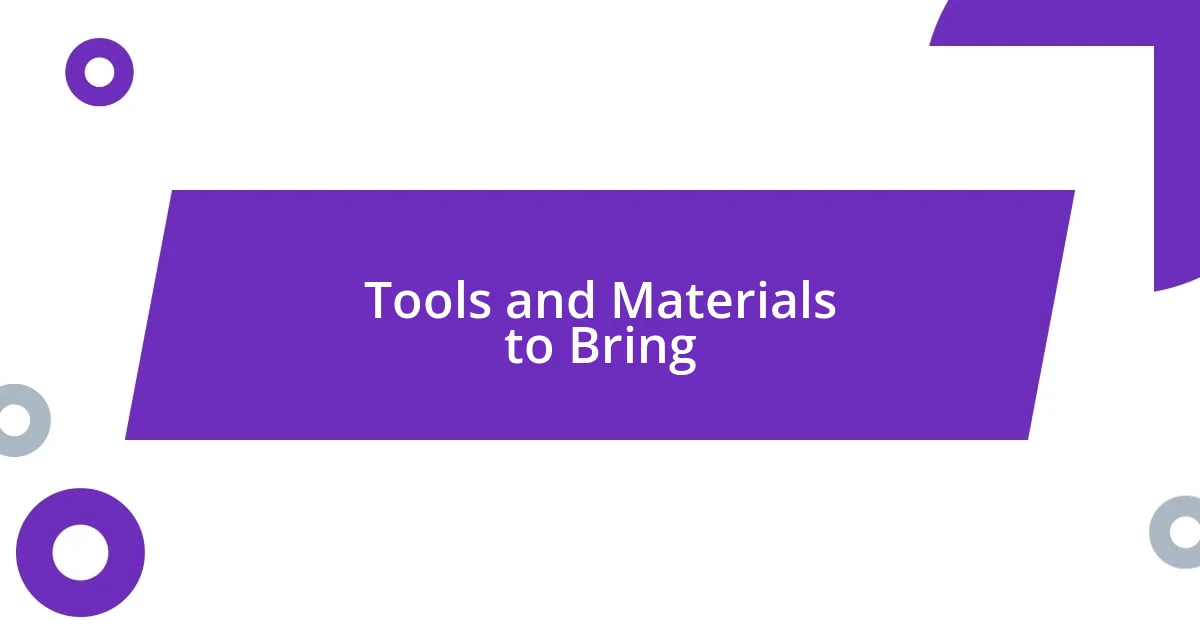
Tools and Materials to Bring
When heading to a craft workshop, I always make a checklist of the tools and materials I need. It’s so easy to forget something small yet essential, like your favorite pair of scissors or a particular shade of thread. Recently, I attended a watercolor painting class and realized I hadn’t packed my water brushes. The instructor had extras, but it made me think—what if I’d needed them for my own technique? That little oversight taught me to double-check my kit before I leave.
I’ve also learned the importance of bringing a personalized toolkit. In one session, I brought my own sewing machine because it’s not just familiar; it lets me work more efficiently. I remember feeling a blend of excitement and nervousness as I set it up amongst the other participants’ machines. But, as I demonstrated a few stitches I was proud of, it not only boosted my confidence but encouraged others to explore their machines too. Have you ever felt that thrill of sharing your passion? It’s invigorating!
Lastly, don’t underestimate the power of bringing along some extra materials, like fabric scraps or embellishments. Once, during a mixed-media workshop, my extra button stash became a delightful source of inspiration for another participant. They ended up turning one of my buttons into a focal point for their piece! Moments like that remind me how collaborative crafting can be, creating joy not just in sharing tools, but in sparking creativity. It’s a humbling experience, and it makes me wonder—what hidden treasures might you share at your next workshop?

Applying Skills at Home
When I got home after my first knitting workshop, I was buzzing with excitement to put my newfound skills into practice. I remember sitting on my couch, yarn sprawled out around me, and feeling an almost tangible thrill as I cast on stitches for my first scarf. Have you ever felt that rush when you realize you can finally create something beautiful? It’s empowering to see progress unfold right before your eyes!
Adapting what I learned from the workshop has also led to some unexpected creative freedom. I recall a moment when I decided to experiment with colors and patterns rather than strictly following the patterns taught. It was both terrifying and exhilarating! The imperfections in my work became a part of its charm. Isn’t it fascinating how the fear of making mistakes can evolve into a celebration of individuality in our creations?
Finding the right rhythm at home isn’t always easy either. I’ve had days when project after project didn’t turn out how I envisioned, and that’s when I remind myself of the warm encouragement from my instructor. By treating my home practice as a journey, rather than a destination, I’ve learned to enjoy the process even when it doesn’t go perfectly. After all, is craft not just about the final piece but also about the joy we find while creating?
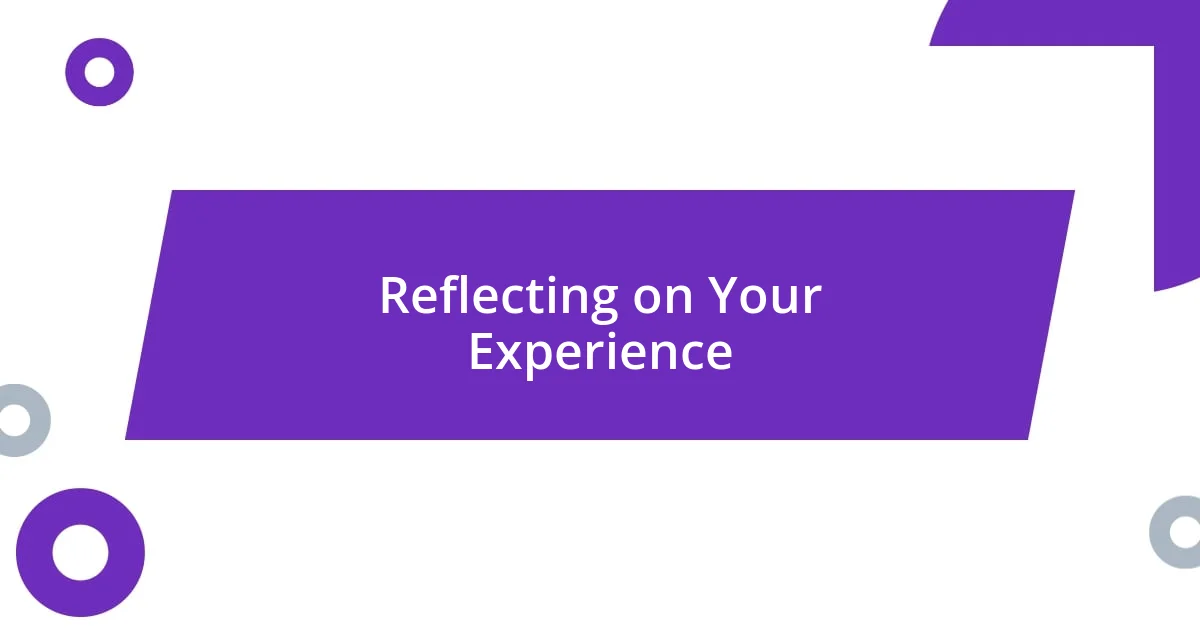
Reflecting on Your Experience
My experience at craft workshops has always left me with a treasure trove of insights, but reflecting on those moments is where the magic truly happens. I can vividly remember after my first pottery class, where my hands were coated in clay, sitting quietly and just taking it all in. The sense of satisfaction mixed with frustration was palpable. How often do we pause to consider the emotions tied to our creative journeys? It’s a reminder that every lump of clay carries potential, just like each of us.
One of the most poignant reflections came during a scrapbooking workshop when I found myself sharing my story behind a particular photo. I realized how powerful it was to not only create visually but to narrate my life’s journey through art. This connection with others in the room was electrifying. Have you ever shared a part of yourself through your craft? It bridges gaps and fosters a sense of community, transforming a simple workshop into a sharing space where our stories intertwine.
Sometimes, I jot down my thoughts right after a workshop while they’re fresh in my mind. Those scribbles often spark new ideas that inspire my next project. I distinctly recall diving into a leather crafting session and being so invigorated by the process that I envisioned an entire line of bags I wanted to create. It’s in those quiet moments of reflection that the seeds of new creativity are planted—reminding me that every experience is not just a lesson in technique but an exploration of self. What might your reflections reveal about your own creative evolution?












